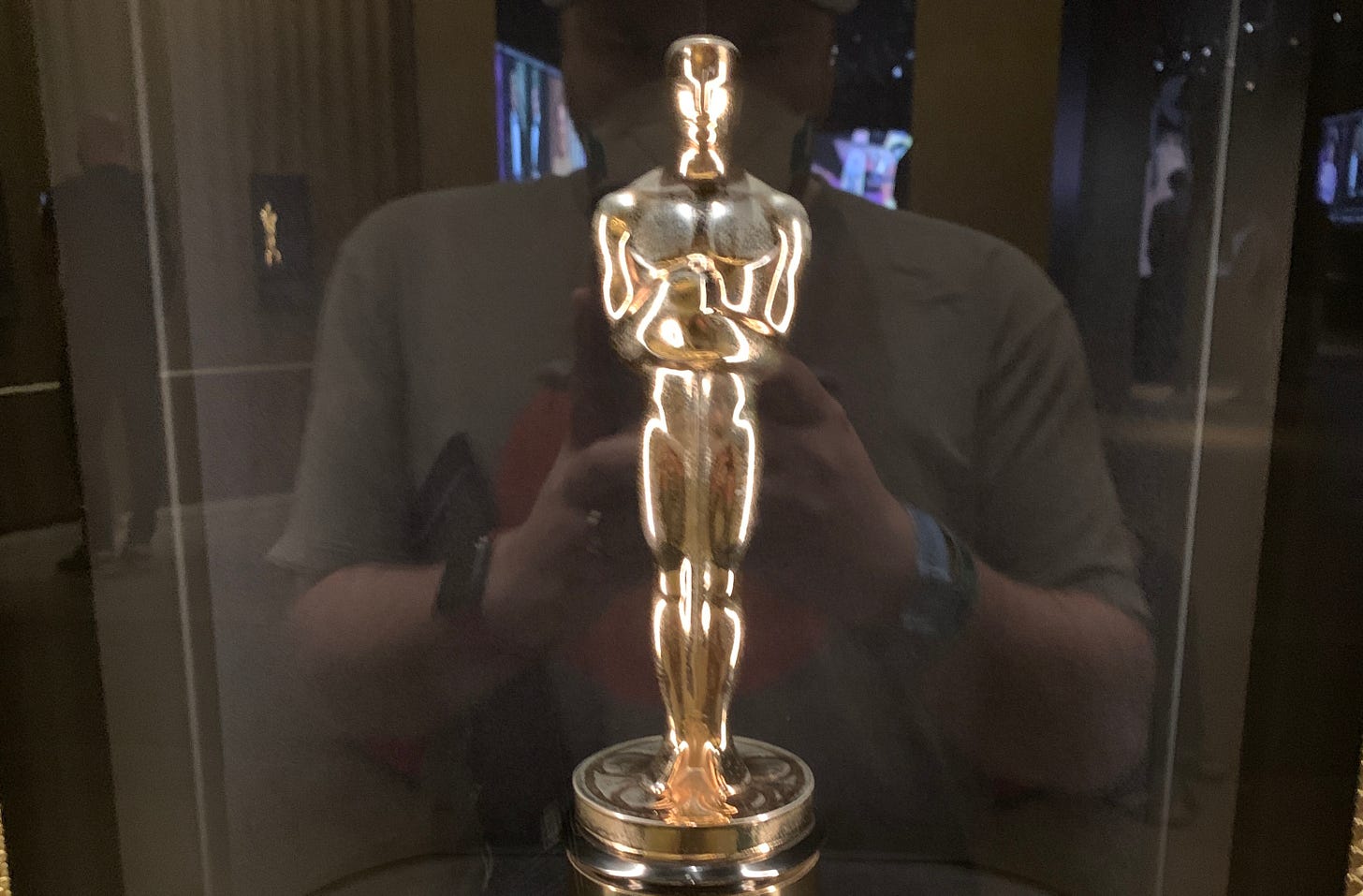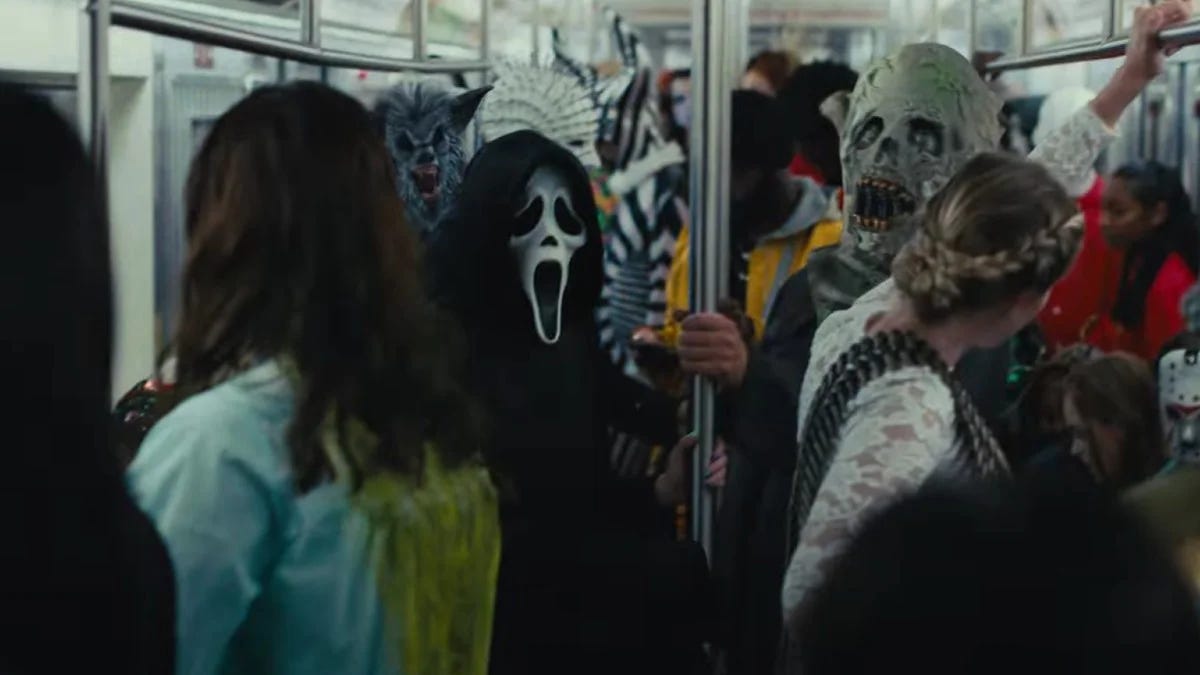Midweek Update: What the Oscars Do
They don't tell us about the best movies; they tell us about Hollywood.
On Sunday, I’ll send out my picks for what I think will win in various Oscar categories because, like the Oscars themselves, it’s becomes an annual tradition. I’m not particularly invested in any wins or losses; even if people I’m rooting for lose that doesn’t necessarily mean their career is doomed or that no one appreciated the movie. As an awards ceremony, it’s a gigantic game. The game can be fun, but once you start looking at the awards as genuine critical appraisal rather than a political campaign fueled by money and influence, you’ve gone astray.
So do the Oscars “matter?” I would say yes, but not in and of themselves. To argue that they got it “right” one year but “wrong” another year misses the Hollywood-centric nature of its nomination process. There was a kerfuffle this year alone because the low-grossing To Leslie was able to score a Best Actress nomination for Andrea Riseborough, who went through a word-of-mouth campaign among voters rather than the studio behind the film buying expensive For Your Consideration ads in major trades and holding lavish parties where she could hobnob with people. That’s not to mention that nominations can be based on something as fickle as a release day on a calendar or proximity to a movie with similar subject matter.
The Oscars exist downstream from larger issues with the industry, not only with how the Academy handles its own business, but the business of making movies in general. You can’t look at it as an objective barometer of quality with the prescience to see what films will stand the test of time.
The Oscars matter because it’s Hollywood giving a snapshot of its own prevailing trends and transformations. Beyond the glitz, the glamour, and the congratulatory montages about The Power of the Movies, you have a group of voters making choices about what they believe should be highlighted and best represents major motion pictures. It tells us about the industry’s aspirations as well as their fears. The movies selected only matter insofar as what they tell us about Hollywood’s thinking at a particular point in time
For example, the #OscarsSoWhite hashtag campaign forced the biggest change in Academy membership in history, clearing out an old guard of elderly white guys who barely worked in the industry any more. The move also created a more diverse body that also pulled from international cinema. But that tension between traditionalists and the new guard remains, which is why you can see the Academy teetering between daring, unconventional works like Moonlight and Parasite and then embracing more crowd-pleasing fare like Green Book and CODA (and why the pendulum is likely to swing back to the unconventional with Everything Everywhere All at Once this year).
If you’re looking at the Oscars to tell you which movies are important, you’ve got it wrong. It’s an interesting guide to what a particular group of people involved in the American film industry thinks, but we know that not every Best Picture winner is an essential work of art that must be viewed to appreciate cinema. For the casual viewer, I doubt they could name the last five Best Picture winners, and that’s okay! There are so many great movies and talented artists who have never been anywhere near the Academy Awards.
But if you care about film history, you want the Oscars around not because they ever tell us where we’re going or which films will stand the test of time, but because they tell us where Hollywood has been. It registers the sea changes. The nominees reflect an industry’s push and pull with the new voices that inevitably emerge as time goes on. So when you watch the Oscars on Sunday night, I’d recommend not getting caught up in wins and losses. Try to see the bigger picture.
What I’m Watching
I continue to love The Bear and we’re also almost done with the six seasons of The Office “superfan” episodes on Peacock. Other than that, I’ve been revisiting the Scream movies in the lead-up to Scream VI, which I saw last night.
The grand irony of the Scream franchise is that a series that started out pointing out the formula of a stale slasher genre has become, itself, formulaic. While Scream (2022) felt like it was finally able to take a step forward by putting new characters at the center (for all of its “reboot” nonsense, Scream 4 is still Sidney’s story), Scream VI highlights the piecemeal nature of the series. At some point, being meta (“It’s a college-set sequel like Scream 2!”) doesn’t really do anything other than tell the audience, “We are aware of what Hollywood is valuing at this time.” Directors Matt Bettinelli-Olpin and Tyler Gillett can construct tense scenes (there’s a sequence on a subway train that’s terrific), but the whodunnit nature ultimately means that you have thin characters so you can slap a motive on them at the reveal if they’re chosen to be the killer.
I still like that they’ve built around the sibling bond between Sam (Melissa Barrera) and Tara (Jenna Ortega), and Sam’s origin has an interesting twist, but the series still insists on doing the same thing over and over. Why not a Scream where we know Ghostface’s identity from the start? Why not a Scream where the cast isn’t primarily young and hot people?
If Scream movies are your thing, then more power to you. But personally, I’m a little burnt out on films that pretend they’re self-aware satires only to keep doing the same thing with a slightly different coat of paint.
What I’m Reading
Speaking of Oscars, I’m making my through Oscar Wars, and will hopefully have it finished before this year’s Oscars. I’ll have more thoughts once I finish it, but right now the highest praise I can give it is that it reminds me of Mark Harris’ Pictures at a Revolution, where the author is using the nominated films as a springboard to talk about what was happening Hollywood and paint a portrait of the important players.
In other reading:
Should theatrical exhibition die, people will be quick to point the finger at the rise of streamers. This excellent article by Lane Brown for Vulture is a potent reminder that major theater chains have completely abdicated any responsibility for ensuring that theatrical projection is worth a damn. Our great directors can champion the theatrical experience all day, but as Brown notes, it’s not like they’re going down to the local Regal multiplex to see what’s up. I understand that major chains have been hurting from the pandemic and the rise of streaming, but it’s not like the theatrical experience was incredible before 2020. Because a large portion of profits come from concessions, too many chain theaters see their business as a place where they dispense junk food and happen to show movies. It doesn’t have to be this way, but chains like AMC are happier to spend on marketing saying how they make movies better without actually making movies better.
What I’m Hearing
Fifty songs to go on the Rolling Stone Top 500 list! I’m not sure “Since U Been Gone” is a better song than “You Oughta Know” and there do seem to be quite a few concessions to appeasing current artists, but I don’t think there’s really anything egregious on the list. It’s not like they’ve got Nickelback on there. (The embedded playlist starts at #500 and counts down)
What I’m Playing
Hogwarts Legacy is still pulling me along, but for the sequel (and the game has been such a massive hit that I can’t imagine Avalanche isn’t already figuring out a new installment), they really need to invest more in the character relationships. I know not every game can be Mass Effect, but I’ve found my travels through Hogwarts to be surprisingly lonely. There are recurring characters, but I wouldn’t say my character has friends or really any meaningful relationships. Maybe that will change, but I’m over 10 hours into the game and the characters simply feel like gameplay-explanation mechanisms and quest-setters rather than people who make the world a richer place.





